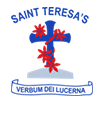Assessment
Each and every day, we assess the pupils through verbal feedback, conversations, observations and the outcomes in their books. Assessment at St Teresa's is not solely in test situations. These daily assessments then build a picture of your child's learning. This is the most effective way of assessing children.
Why do we give feedback?
At St Teresa's, we believe that by giving your pupil feedback, it will develop your child in the best possible way. We do this to:
- motivate the child in their learning
- create an opportunity to move learning on by:
- Addressing a misunderstanding
- Reinforcing a skill or key piece of information
- Extending a child’s understanding or ability to do something
The purpose of feedback
Feedback should be timely and respond to the needs of the individual student so that they can actively engage with the feedback. This can be conducted in a variety of ways:
● A dialogue, either verbal or written, should be created between teacher and child. When feedback is shared with pupils, it is essential to allow time for children to read the comments and engage with the feedback;
● Where appropriate, pupils should be encouraged to assess their own work against the learning objectives and success criteria;
● Peer and self-feedback is a valuable tool for learning that should occur regularly
● Feedback should empower children to take responsibility for improving their own work.
At St Teresa's Catholic Primary School, we believe that feedback is most effective when it is immediate and addresses misconceptions during the lesson. In addition to immediate feedback, staff may also use summary feedback (at the end of a lesson / task) and review feedback (away from the lesson) if this is more appropriate for improving pupils’ learning.
Summative assessment
In addition to formative assessment, children are formally assessed against the National Curriculum on a termly basis. Their attainment is assessed against age-related expectations for their year group and is done through Teacher assessment (detailed above) and sometimes through school tests. This data is recorded on the school’s data system Target Tracker. Following these assessments, teachers meet with SLT to look at the attainment and progress of each pupil and plan and implement interventions and support to ensure that they are making at least expected progress.
St Teresa's uses an assessment system called Target Tracker which uses bands and steps. The band corresponds with your child’s year group – band 2 for year 2. Within each band there are 6 steps as follows:
|
B (Beginning ) |
B+ (Beginning+) |
W (Working within) |
W+ (Working within +) |
S (Secure) |
S+ (Secure+) |
This allows the pupils to make 6 steps, ideally 1 step per half term. Pupils should aim to end the year at a S, so a Year 2 pupil should end the year as a 2S. The National expectation is to reach a W+ to be working at Age Related Expectations, however at St Teresa’s, we hold high expectations of the pupils and would like all children to be secure (S) in their band in July before moving to a new band and year group in September. This means the pupils are working well within their age expectation and are ready to embrace learning in the next academic year. At the beginning of a new school year, the previous year’s content will be secured before moving on to the new band expectations. This allows the pupils to fully secure and master their prior knowledge before moving on.
On the left are the child friendly 'I can' skills statements produced by Target Tracker which you may find useful to look at. They show progression in skills learned and taught from Year 1 to Year 6 in each subject. The teachers use these on Target Tracker Termly to assess your child's acquisition of skills and tailor their teaching accordingly.
Statutory Testing
All schools are required by the DFE to carry out the following statutory tests:
- Reception – EYFS baseline in September
- Year 1 – phonics screen in June
- Year 2 – Key Stage 1 SATs in Summer 2
- Year 4 – Multiplication Tables Check in June
- Year 6 – Key Stage 2 SATs in May
At St Teresa's, we aim to ensure that the children are fully prepared for these tests and that exceptional consideration is given to their emotional well-being.
